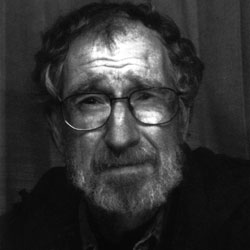The inverse of language is like a laughter that seeks to destroy language, a laughter infinitely reverberated.
– EMMANUEL LEVINAS
The laugh that ate the snake and
runs through the city dressed in a sneeze, the mischief
done in these sly
passages of time, when the tongue is
severed from the voice and
fed to the weather, when the running
patter of catbirds simply
swallows the agenda, nothing to be held back,
nothing rescued in a catch-phrase or figure, your
house is on fire
and your children are gone.
When evenings pass as unseen
immaculate ships, and folk –
everyone is suddenly folk – rush to their porches
and lift their faces to this
effervescence of air,
wishing.
Wishing what?
Just wishing.
Notes on the Poem
What happens when something vaguely remembered calls to you from a poem? Let's look at something familiar woven into "The Laugh" by Don McKay, from his 2004 Griffin Poetry Prize shortlisted collection Camber. Does this ring a bell? "your house is on fire and your children are gone." Of course it does. The line, in a few variations, is taken from what is known as antlion folklore, and it has to it the presumed power or magic of a charm used to break a spell. That is perhaps what McKay is illustrating is the power of a laugh, characterized by the power of disruption described in the Levinas epigraph to the poem. There is so much that a laugh, described so perfectly as "this effervescence of air" can reset or set aright, as it "swallows the agenda, nothing to be held back, nothing rescued in a catch-phrase or figure" Do you agree?
